Capital University of Economics and Business at a Glance
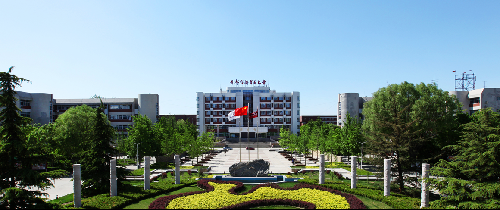
Founded in 1956, the Capital University of Economics and Business (CUEB) today is a leading university administered by the Beijing Municipality. CUEB took its current form in 1995 when the Beijing College of Economics and the Beijing Institute of Finance & Trade merged into one. Over the last 60 years, CUEB has grown into a modern, multidisciplinary university with program advantages in the subject areas of economics, management, law, literature, and science and engineering, of which economics and management are the core disciplines.
The main campus of CUEB is located in Huaxiang, Fengtai District, and concentrates on full-time undergraduate and postgraduate education, while the Hongmiao Campus in Chaoyang District focuses on international and continuing education.
Key Academic Programs and Achievements
CUEB boasts 4 first-class disciplines that confer doctoral degrees (applied economics, management science and engineering, business administration and statistics), 4 post-doctoral research programs (applied economics, statistics, business administration and management science and engineering), 10 first-class disciplines that confer master degrees, 17 programs offering profession-oriented master degrees and 43 undergraduate programs. There are 19 teaching divisions in total, including the School of Urban Economy and Public Administration, School of Business Administration, School of Economics, School of Accounting, School of Labor Economics, School of Culture and Communications, School of Information, School of Safety and Environmental Engineering, School of Public Finance and Taxation, School of Law, School of Finance, School of Statistics, Foreign Language Department, School of Overseas Chinese, School of Marxism, International School of Economics and Management, Division of Physical Education, School of International Education, School of Continuing Education.
The Department of Labor Economics at CUEB is accredited as a key national academic program, and is a member of the Exceptional Key Disciplines Project administered by the Ministry of Education. The Departments of Applied Economics and Statistics are both key first-class disciplines in Beijing, having been ranked 12th and 15th respectively among 88 universities, and 5th among finance and economics universities in the Ministry of Education’s 3rd round of appraisals. The business management and accounting programs have been certified as key second-class programs in Beijing; management science & engineering are key first-class development programs in Beijing, 7 programs including the political economy department were certified as key second-class development disciplines in Beijing. CUEB’s programs in economics, labor and social security, statistics and human resources management have been distinguished as “unique majors” at the national level. Of these, economics, statistics and labor and social security are designated as pilot programs for national comprehensive program reform. Programs for political economy, labor economics and social security are recognized as excellent national curricula, with political economy and social security classified as excellent national open courses, financial accounting, international economics and international business as national model bilingual courses. Teachers of human resources management and economics core courses are acknowledged as quality national teaching teams. CUEB also has strong facilities resources. Its Economics & Management Experimental Teaching Center is rated a national university experimental teaching center; the International Economics Professionals Education Experiment Zone is ranked as a national model innovation experiment zone for professional education. Deloitte Huayong, which has strong cooperative ties with the School of Accounting, is approved as a national field project base for university students. Into the World of Management is recognized as a national excellent video open course. In 2013, CUEB was distinguished as a National Education Base for Ecological Civilization.
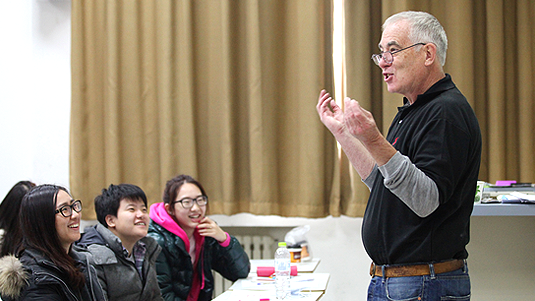
Student Body and Alumni at a Glance
Today, CUEB has 17,948 registered students, including 9,908 undergraduates,221 junior college students, 2,797 master’s degree students, 351 doctoral candidates, 1016 international students and 3,655 continuing education students. University admission scores are among the top for universities administered by the Beijing Municipality. Moreover, in recent years, the university has witnessed an increasing number of students pursuing further education both at home and abroad. The over 95% employment rate for new graduates has earned the university an excellent public reputation.
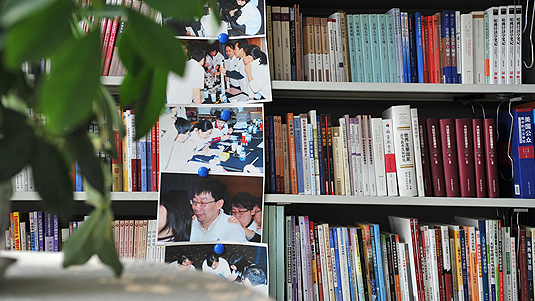
Faculty at a Glance
CUEB currently has 1,471 faculty members, of which 813 teach full time. 67% of faculty members have a Ph.D., 172 are either full professors or equivalent, 301 are associate professors or equivalent. There are 68 doctoral student advisers and 418 master student advisers. Among the current faculty there is one national outstanding teacher, one recipient of the National Distinguished Educator award, one scholar supported by China’s “Thousand Talents Program”, three in New Century Talent Support Program of the Ministry of Education, 6 awarded the Special Government Allowance of the State Council, 18 recipients of Beijing Distinguished Educator awards, and 7 supported by Beijing High-level Overseas Talent Program. In 2006, the university initiated a teacher career development program and established the CUEB Office of Teacher Advancement (OTA), one of just a few programs in this category in China. CUEB’s OTA is a teacher -governed organization dedicated to teacher career planning and advancement, the first of its kind in Beijing. The “Non-administrative OTA Development Model” project is a second prize winner of the national teaching achievement prize.
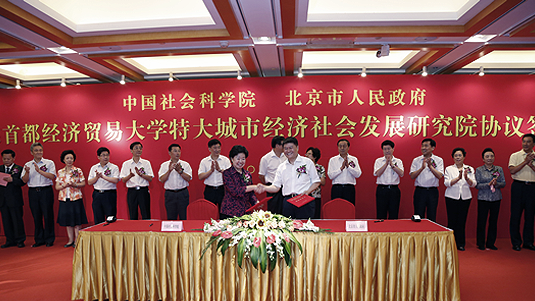
Special Programs and Publications
The CUEB Academy of Metropolis Economic and Social Development (AMESD) is a collaborative research center in Beijing, encompassing two municipal level philosophy and social sciences research bases, the Beijing CBD Research Base and the Beijing Economic & Social Development Policy Research Base, as well as 30 university level research institutes including the Research Institute of Demography & Economics and the Research Institute of Capital Economy. CUEB publishes influential academic journals. Economy and Management Study is a CSSCI source journal, national core Chinese journal, China core journal on humanities, RCCSE core journal. Demography and Economy is one of the earliest demographic journals in China and it is also a CSSCI source journal, national core Chinese journal, China core journal on humanities, one of the 200 key journals funded by the National Social Sciences Funds.
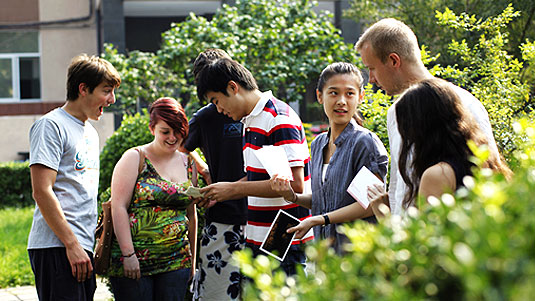
28International Programs
CUEB has strong cooperative ties with 117 universities, research institutes and social organizations in 28 countries and regions. It began enrolling international students in 1986 and it has formed a multi-level and multi-disciplinary education system for international students. In 2015, CUEB’s enrollment reached 1,016 overseas students from 70-odd countries, including Ph.D., master’s degree, undergraduate, senior and regular non-degree programs, language program and short-term training students. The university began to offer an English language master’s degree program in 2007, and a Ph.D. program starting in 2011.
University Motto and Mission
The university is inspired by its motto “Advocate morality, value competence, strategize national development, and serve the people”, and follows the strategy of “Based in Beijing, serving the capital, supporting the nation, and looking to the world”. CUEB is committed to graduating students that are well-rounded, suited to the contemporary needs of modern social development, innovative, effective with a wide breadth of knowledge, and have a mastery over both the theoretical and the practical sides of what they choose to study. CUEB is making great strides towards realizing its vision of building a modern, international, multidisciplinary and unique university that is first in its class China, and respected all over the world.